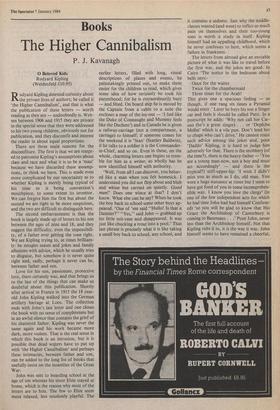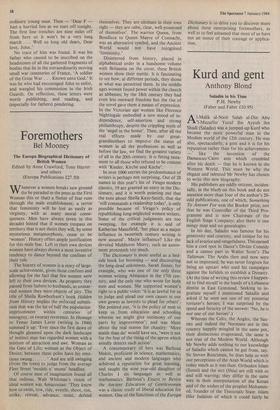Books
The Higher Cannibalism
P. J. Kavanagh O Beloved Kids Rudyard Kipling (Weidenfeld £10.95) RudyaRudyard Kipling detested curiosity about rd private lives of authors; he called it `the Higher Cannibalism', and that is what the publication of these letters — worth reading as they are — undoubtedly is. Writ- ten between 1906 and 1915 they are private in the special sense that they were addressed to his two young children, obviously not for publication, and they discomfit and interest the reader in about equal proportions.
There are three main reasons for the discomfiture. The first is that we are tempt- ed to patronise Kipling's assumptions about class and race and what it is to be a 'man' because we have discarded these assump- tions, or think we have. This is made even more complicated by our uncertainty as to whether Kipling is merely being typical of his time or is being convention's mouthpiece, to some extent its inventor. We can forgive him the first but about the second we are right to be more suspicious, and the two are difficult to distinguish here.
The second embarrassment is that the book is largely made up of letters to his son between the ages of nine and 18, and they suggest the difficulty, even the impossibili- ty, of a father ever getting the tone right. We see Kipling trying to, at times brilliant- ly: he mingles teases and jokes and family allusions with advice, which he usually tries to disguise, but somehow it is never quite right and, sadly, perhaps it never can be, between father and son.
Love for his son, passionate, protective love, there certainly was, and that brings us to the last of the things that can make us doubtful about this publication. Shortly after arrival in France in 1915 the 18 year- old John Kipling walked into the German artillery barrage at Loos. The collection ends with John's last letter and one closes the book with no sense of completeness but in an awful silence that contains the grief of his shattered father. Kipling was never the same again and his work became more dark, more violent. That is the real sense in which this book is an intrusion, but it is possible that dead writers have to put up with 'the Higher Cannibalism' and perhaps these intimacies, between father and son, can be added to the long list of books that usefully insist on the insanities of the Great War.
John was sent to boarding school at the age of ten whereas his sister Elsie stayed at home, which is the reason why most of the letters are to him. The few to Elsie seem more relaxed, less resolutely playful. The
earlier letters, filled with long, visual descriptions of places and events, he painstakingly printed out, to make them easier for the children to read, which gives some idea of how seriously he took his parenthood; for he is extraordinarily busy — and feted. On board ship he is moved by the Captain from a cabin to a suite (he encloses a map of the lay-out — 'I feel like the Duke of Connaught and Mummy feels like the Duchess') and in Canada he is given a railway-carriage (not a compartment, a carriage) to himself; if someone comes for the weekend it is 'Stan' (Stanley Baldwin), if he talks to a soldier it is the Commander- in-Chief, and so on. Even in these, on the whole, charming letters one begins to trem- ble for him as a writer, so wholly has he now identified himself with authority.
`Well, from all I can discover, you behav- ed like a man when you felt homesick. 1 understand you did not flop about and blub and whine but carried on quietly. Good man!' Does one wince at that? I don't know. What else can he say? When he took the boy back to school some other boys ap- peared. 'One of 'em said "Hullo! Is that a Daimler?" "Yes," said John — grabbed up his little suit-case and disappeared. It was just like chucking a trout into a pool.' That last phrase is precisely what it is like taking a small boy back to school, any school, and
it contains a sadness. Just why the middle- classes wanted (and want) to inflict so much pain on themselves and their too-young sons is worth a study in itself. Kipling himself had an appalling childhood, which he never confesses to here, which seems a failure in frankness.
The letters from abroad give an enviable picture of what it was like to travel before the first war, and the jokes are good. In Cairo 'The notice in the bedroom about bells says:- Once for the waiter Twice for the chambermaid Three times for the Arab!
This gives one a spacious feeling — as though, if one rang six times a Pyramid would enter.' Later he buys his son a Singer car and feels it should be called Patti. In a postscript he adds: 'Why not call her Car- uso (he's a great singer) . . . or `Depeche Melba' which is a vile pun. Don't lend her to chaps who can't drive.' He cannot resist such advice among the jokes and, poor `Daddo' Kipling, it is hard to judge him adversely for that. There is the snobbery (of the time?), there is the heavy-father — 'You are a young man now, not a boy and must act accordingly' — and there is the (typical?) stiff-upper-lip: 'I wish I didn't miss you as much as I do, old man. You were a huge nuisance at times but I seem to have got fond of you in some incomprehen- sible way. I know you love the clergy' (in one of the few independent acts for which he had time John had had himself Confirm- ed) 'so you will be glad to know that His Grace the Archbishop of Canterbury is coming to Batemans . . .' Poor John, never less than the Archbishop himself. Not that Kipling rubs it in, it is the way it was. John himself seems to have remained a cheerful,
ordinary young man. Then — 'Dear F Just a hurried line as we start off tonight. The first line trenches are nine miles off from here so it won't be a very long march . . Well so long old dears, Dear love, John.'
No trace of him was found. It was his father who caused to be inscribed on the headstones of all the gathered fragments of bodies that lie in the extraordinarily moving small war cemeteries of France, 'A soldier of the Great War . . . Known unto God.' It was he who had encouraged John to enlist, and wangled his commission in the Irish Guards. On reflection, these letters were worth publishing, and reading, and (especially for fathers) pondering.



































 Previous page
Previous page